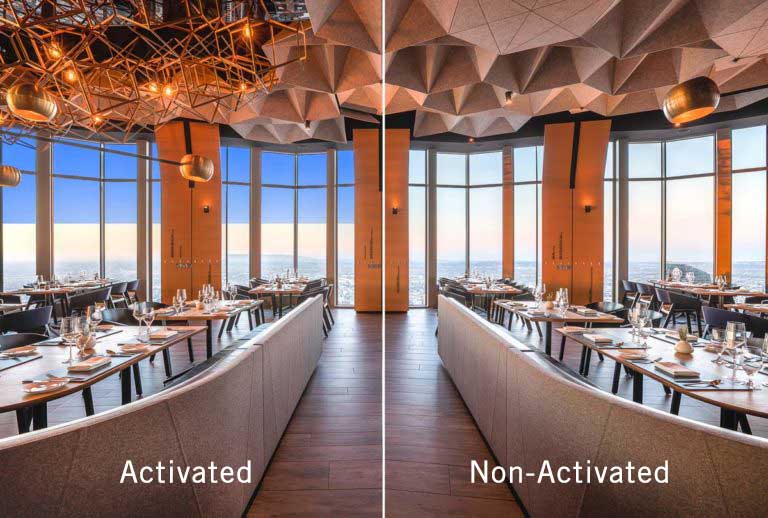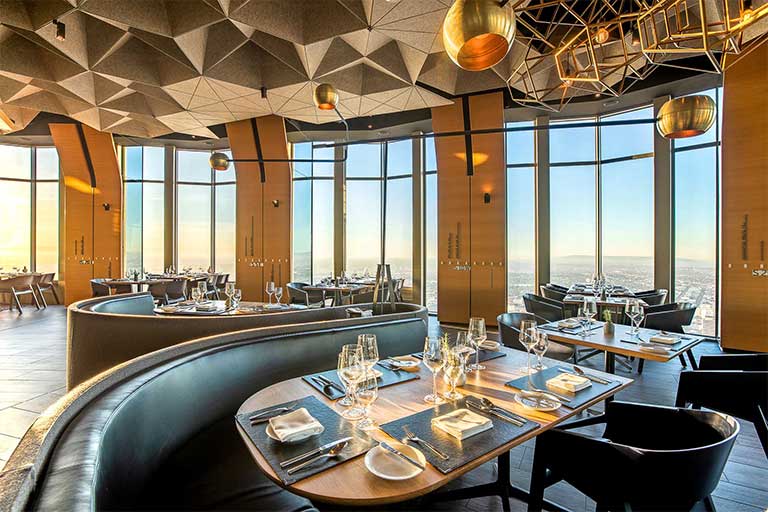Get to Know Dynamic Glass
Dynamic glass applications are among the many new technologies commercial glazing manufacturers have developed to improve energy efficiency and comfort in buildings. When applied during their manufacturing process to individual units of glass, these special coatings enable customizable properties to provide better temperature and light control for curtain wall systems, storefront, and interior installations, among others. With their responsive nature, these technologies can help regulate the comfort, sunlight, heat gain, and privacy within a given environment, while reducing reliance on energy-consuming HVAC and artificial lighting systems.

There are several categories of dynamic glass products on the market, each developed to address specific glazing needs. Due to their size and expense, products using this technology are generally used for commercial applications, as opposed to residential projects.

Electronic vs. Environmental Applications
Broadly speaking, dynamic facades fall into one of two categories: electrically-powered or environmentally-triggered. In electrically-powered applications, a very low electric current is used to shift the properties of the glass. Environmental facades rely solely on external triggers, like sunlight and temperature, to activate the shift in their appearance and functionality.
Electronically Powered Dynamic Glass
Electrically powered applications include electrochromic, or “smart glass” and PDLC (polymer dispersed liquid crystal) and SPD (suspended particle device) glass. Electrochromic glass is the most widely used of these, and it allows for extensive control of environmental factors like light, heat, and glare. PDLC and SPD glass are generally used in interior spaces, and adjust their opacity and/or tint for enhanced privacy, light control, and more.
Environmentally Triggered Applications
The environmental application used most frequently in construction and glazing is known as thermochromic glass, which is activated by solar heat. The more direct the sun exposure, the hotter the glass gets, activating the appearance of a tint. As the sun recedes, the glass cools, and the tint disappears in varying degrees.
Thermochromic glass does not provide as much control as electrochromic glass, but it is helpful for shading large windows from direct sunlight, protecting interiors of office buildings, large residential developments, and other tall, reflective surfaces during the hottest, brightest hours of the day.
Photovoltaic Glass: The Future of Dynamic Glass
Photovoltaic glass is a sophisticated and developing technology that actually generates electricity for a building. This product laminates photovoltaic cells – the same semi-conductor cells used in solar panels – between two panes of glass to capture solar energy. A building that uses a substantial amount of photovoltaic glass is capable of producing and supplying its own electricity needs through its windows. The power generated is considered “green,” or “clean electricity,” because its source is renewable and it does not cause pollution.
Because it is such a new technology, the glass itself often requires a significant investment up front when compared to other glass products. However, the justification is that these initial higher costs will ultimately pay for themselves over time in energy cost savings. We also predict the price will become more accessible as the technology evolves and becomes more widely available. Additionally, photovoltaic glass can help reduce a facility’s carbon footprint. This not only contributes to sustainability, it also can be leveraged to enhance branding and public relations efforts.
Trust Our Experts
Dynamic glass technologies have evolved to meet the needs of a number of environments, budgets, and preferences. Whether you’re looking to increase energy efficiency, make a space more comfortable, or simply achieve a distinct aesthetic, dynamic glass is a great choice, provided it’s installed correctly. With over 75 years in the business, Giroux Glass has experience with handling the intricacies of dynamic glass and other commercial glazing systems. Contact us at any time to discuss your needs. We are highly qualified and can provide the expertise and professionalism required to bring your project to life.